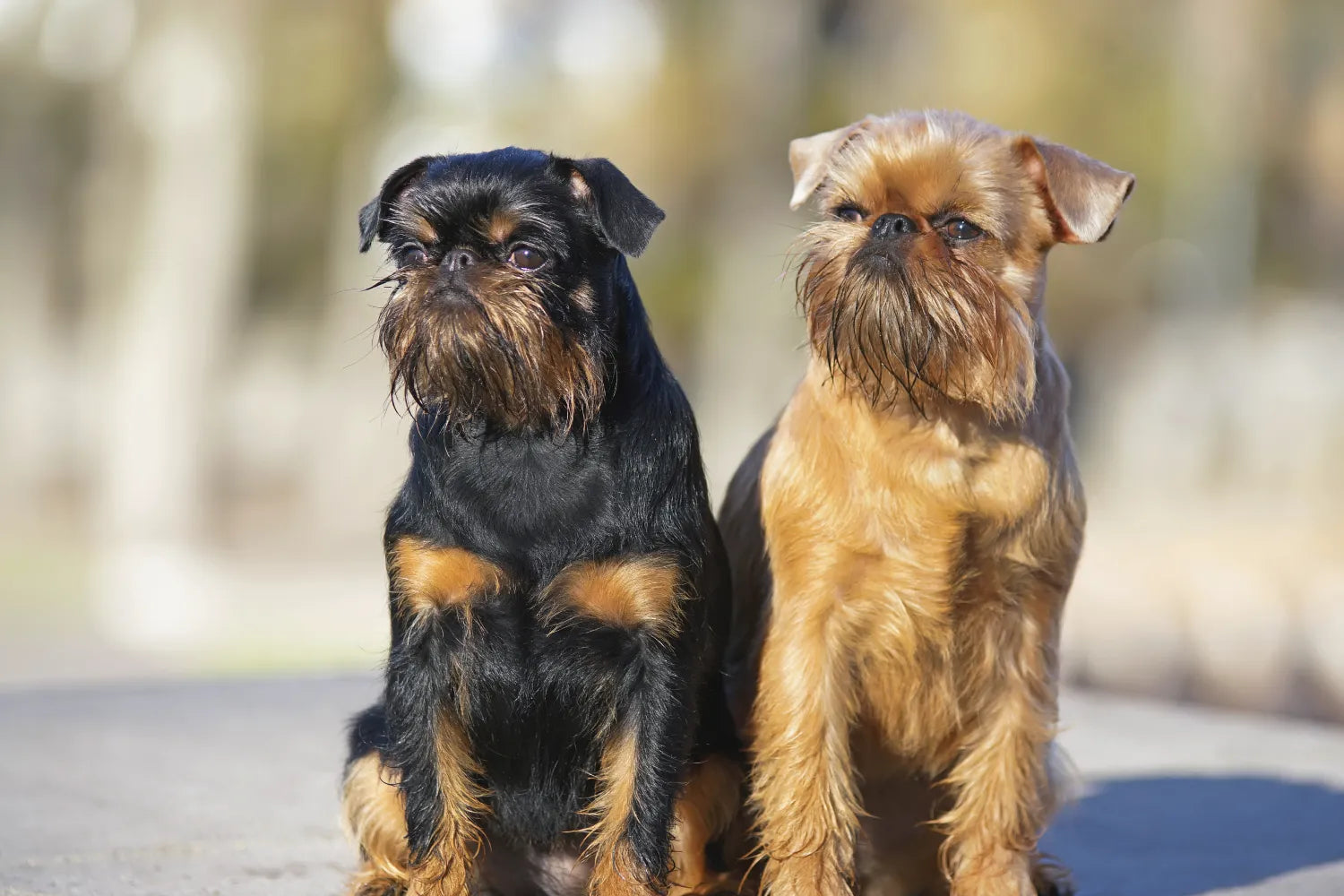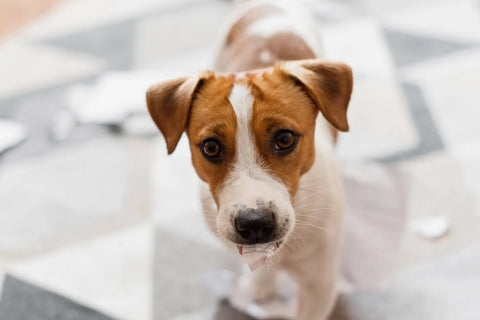
Understanding the Brussels Griffon Dog Breed
Table of Contents
- WHAT’S THE ORIGIN STORY OF THE BRUSSELS GRIFFON?
- WHAT ARE THE DISTINCTIVE FEATURES OF THE BRUSSELS GRIFFON?
- HOW DOES THE BRUSSELS GRIFFON BEHAVE?
- WHAT ARE THE GROOMING AND CARE NEEDS OF BRUSSELS GRIFFONS?
- WHAT HEALTH CONSIDERATIONS SHOULD OWNERS KEEP IN MIND?
- WHAT DOES FEEDING AND NUTRITION LOOK LIKE FOR BRUSSELS GRIFFONS?
- Brussels Griffon Feeding Chart
- HOW MUCH EXERCISE AND ACTIVITY DOES A BRUSSELS GRIFFON NEED?
- A FINAL WORD
Welcome to the delightful world of the Brussels Griffon, a breed that packs a whole lot of personality into a pint-sized package! Here at A Pup Above, we're all about celebrating the unique quirks and qualities of different dog breeds, and the Brussels Griffon is no exception.
With roots in the heart of Belgium, this little dog has charmed its way from being a skilled hunter to a beloved companion in homes around the world. Known for their almost human-like expressions and spirited demeanor, Brussels Griffons are companions with character.
Join us as we explore the fascinating history, distinct features, and heartwarming personality of this adorable breed.
WHAT’S THE ORIGIN STORY OF THE BRUSSELS GRIFFON?
The story of the Brussels Griffon is as charming as the breed itself. Originating in Brussels, Belgium, this breed began its journey as a tenacious vermin catcher in the 19th century.
Here's a glimpse into their fascinating history:
- Belgian Beginnings: Initially bred to keep stables free from pests, the Brussels Griffon quickly demonstrated its value in bustling European cities.
- A Melting Pot of Breeds: Influences from other beloved breeds like the Pug, King Charles Spaniel, and Affenpinscher gave the Brussels Griffon its distinctive appearance and temperament.
- From Streets to Stardom: The breed evolved from a hardworking Belgian street dog to a cherished companion, even capturing hearts in popular culture, as seen in the film "As Good as It Gets."
WHAT ARE THE DISTINCTIVE FEATURES OF THE BRUSSELS GRIFFON?
The Brussels Griffon may be small in size, but it's certainly big in character.
Here's what sets this breed apart:
- Unique Appearance: With their large, soulful eyes and a pout that's hard to ignore, Brussels Griffons often look like they're pondering the deeper mysteries of life.
- Compact and Cuddly: Typically weighing between six and 12 pounds, they're the perfect size for a lapdog.
- Coat Types and Colors: The breed comes in two coat varieties — the rough-coated Griffon Bruxellois and the smooth-coated Petit Brabancon, with color variations including shades of reddish-brown.
- Subtypes: The breed is further divided into three subtypes — the Griffon Bruxellois, the Belgian Griffon, and the Petit Brabancon, each with its own unique flair.
Each of these features contributes to the Brussels Griffon's one-of-a-kind charm, making them a fantastic companion for those lucky enough to share their lives with one.
HOW DOES THE BRUSSELS GRIFFON BEHAVE?
The Brussels Griffon, with its pint-sized confidence and heart full of love, is truly a character!
Their personality is a delightful mix of traits that make them an engaging companion.
- Confident and Lovable: Despite their small stature, they often carry themselves with an air of self-importance. But don’t let this fool you; they are incredibly affectionate and thrive on love and attention from their human families.
- Family Dynamics: These small dogs fit wonderfully into family life. They are known for their strong attachment to their owners, often following them around like little shadows — earning them the nickname “velcro dogs.” However, due to their small size, interactions with very young children should be supervised to ensure gentle play.
- Social and Alert: Brussels Griffons are social little beings but can be reserved with strangers, making them excellent watchdogs. Early socialization is key to helping them become well-rounded pets, comfortable with different people and situations.
WHAT ARE THE GROOMING AND CARE NEEDS OF BRUSSELS GRIFFONS?
Grooming a Brussels Griffon is more than a beauty routine — it is a bonding experience.
Here’s what you need to know about keeping them looking and feeling their best:
- Brushing and Bathing: Whether you have a rough-coated or smooth-coated Griff, regular grooming is essential. Weekly brushing keeps their coat healthy, and occasional baths help them stay clean and fresh.
- Coat Care Variations: The rough-coated variety may require more frequent grooming to prevent matting, while the smooth-coated ones will benefit from more regular baths.
- Additional Grooming Needs: Pay special attention to their expressive faces. Regular eye cleaning is important to prevent irritation, and those with longer facial hair might need trims to keep their vision unobstructed.
Caring for Brussels Griffons' grooming needs is not just about maintaining their adorable looks but is also crucial for their overall well-being. Plus, it's another way to strengthen the special bond between you and your pint-sized companion.
WHAT HEALTH CONSIDERATIONS SHOULD OWNERS KEEP IN MIND?
When it comes to the well-being of the Brussels Griffon, being aware of certain health considerations is crucial for ensuring a long and happy life:
COMMON HEALTH ISSUES
Brussels Griffons are prone to specific health problems like patella luxation, where the kneecap slips out of place, and hip dysplasia, affecting the hip joint. They can also develop cataracts, which may impair their vision.
BRACHYCEPHALIC CHALLENGES
Due to their brachycephalic (flat-faced) nature, these dogs can experience breathing difficulties and are more susceptible to heat stroke. It's important to monitor their breathing and keep them cool in warm weather.
PREVENTIVE CARE
Regular veterinary check-ups are essential. These not only help in early detection of potential health issues but also provide an opportunity for pet parents to discuss preventive care measures.
WHAT DOES FEEDING AND NUTRITION LOOK LIKE FOR BRUSSELS GRIFFONS?
The Brussels Griffon may be small, but its nutritional needs are mighty important.
Here’s how to ensure your pint-sized companion is getting the right nourishment:
- Balanced Diet for Small Breeds: Brussels Griffons, like other small breeds, require a nutrient-rich diet that's appropriately portioned to their size. It's all about quality over quantity — they need food that's high in nutrients but not too calorie-dense to avoid weight gain.
- High-Quality Ingredients: At A Pup Above, we believe in using only the best ingredients. Our meals for small breeds like the Brussels Griffon are packed with wholesome, human-grade ingredients, ensuring your pup gets all the necessary nutrients in every bite.
- Maintaining a Healthy Weight: It's crucial to monitor your Griffon's weight. Overfeeding can lead to obesity, which is a common problem in small breeds. Regular, measured meals and healthy treats can help keep them in top shape.
Brussels Griffon Feeding Chart
Now that you’ve got a grasp on the adorable quirks and care needs of the Brussels Griffon, let’s dive into how to keep them well-fed and wagging. What’s the right food? How much and how often?
Let’s break it down by their life stages.
Feeding Guide by Life Stage
- Brussels Griffon Puppies (under 1 year): These little bundles of joy need energy for all their puppy antics. Serve them high-quality puppy food that’s packed with proteins and fats to support their growth. Think about including puppy-appropriate fruits as snacks — a nod to our "What Fruits Are Good For Dogs?" article for some fresh, juicy ideas.
Amount of Food: A Brussels Griffon pup typically needs about ¼ cup of food per meal, three times a day. Monitor their growth and adjust as necessary to sidestep any risk of obesity — keeping them lively, not lethargic.
Snack Time: Little treats play a big part in training. Choose small, nutritious nibbles to keep them keen and attentive without overdoing the calories.
- Adult Brussels Griffons (1-10 years): Transition your Griff to adult dog food as they mature, tailored to maintain their energy without packing on pounds. Focus on foods that are nutrient-rich but low on empty calories and fillers.
How Much To Feed: An adult Griff typically manages well on about ½ cup of total food per day, split into two servings. Check if their energy levels and body condition suggest tweaks to this amount.
- Seniors (over 10 years): Older Griffs need adjusted nutrition focusing on supporting joint health and maintaining a healthy weight. Opt for kibble formulated for seniors (not puppy food) that's easier to chew and still rich in essential nutrients.
Feeding Amounts: Cut down portions slightly according to their less active lifestyle, ensuring every calorie counts and contributes to their overall well-being.
HOW MUCH EXERCISE AND ACTIVITY DOES A BRUSSELS GRIFFON NEED?
Despite their small size, Brussels Griffons are energetic dogs that need regular exercise to stay healthy.
Here’s how you can keep your Brussels Griffon active and engaged:
- Daily Walks Are a Must: A daily walk is essential for keeping your Griffon physically fit and mentally stimulated. These walks are also a great opportunity for them to explore the world and bond with you.
- Playtime for Mental and Physical Health: In addition to walks, make sure to include playtime in their routine. Interactive games and toys will help keep them entertained and active.
- Mental Stimulation: It's not just about physical exercise. Mental stimulation is equally important for this intelligent breed. Puzzle toys, training sessions, and new experiences can keep their minds sharp.
Regular exercise and mental stimulation are key to a happy and healthy Brussels Griffon. By keeping them active, you're taking care of their physical health and ensuring their mental well-being.
A FINAL WORD
In the diverse tapestry of dog breeds, the Brussels Griffon stands out with its unmistakable charm and spirited personality. These small but mighty companions bring a unique blend of affection, energy, and character into the lives of their families.
At A Pup Above, we understand that each breed brings its own special story, and the Brussels Griffon's tale is one filled with joy, resilience, and lots of love. Whether it's through providing well-balanced meals or sharing insights into their care, we're here to celebrate and support the journey of pet parents with these remarkable family dogs.
Here's to the Brussels Griffon, a small breed with a big heart!
Sources:
Brussels Griffon History: From Scruffy Ratter to Beloved House Pet | AKC
Brussels Griffon Dog Breed Information | American Kennel Club
Why Does My Dog Follow Me Everywhere? It's in Their Genes | AKC
Flat face dog breeds and health issues | The Humane Society of the United States
Top Stories

Why Do Dogs Lick Their Paws?

Why Do Dogs Whimper & Make Noises in Their Sleep?

Healthy Vet-Approved Homemade Dog Food Recipes

How To Cook Sweet Potatoes for Dogs






















